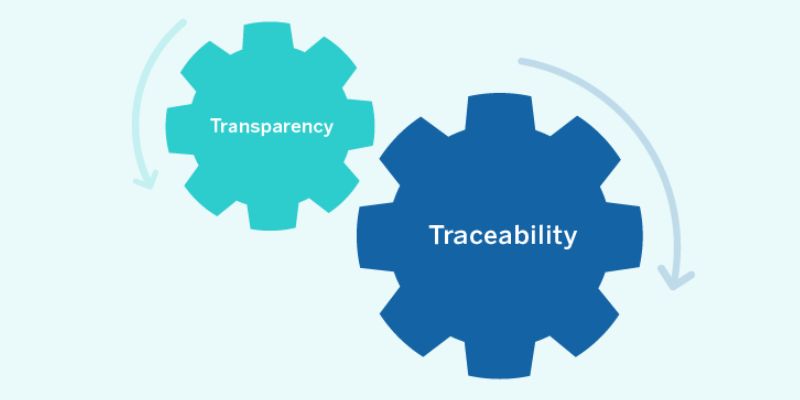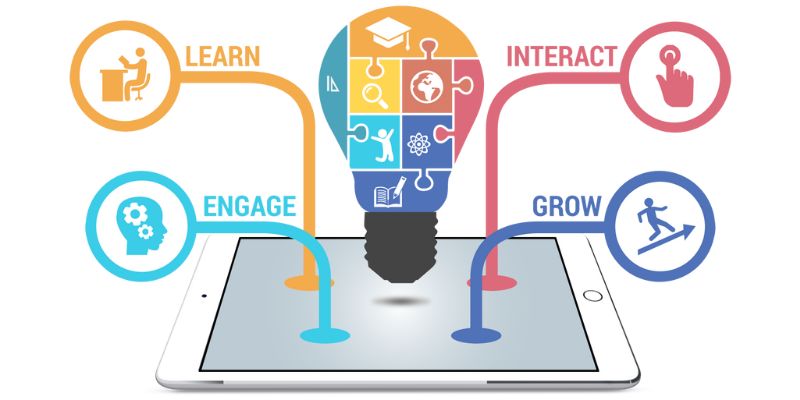Blockchain Breakthrough: Revolutionizing Supply Chain Management and Traceability
Think about it: when you buy something, don’t you want to know where it comes from? Or that it’s truly what it claims to be? I sure do, and that’s why supply chain management and traceability with blockchain are game-changers. This tech isn’t just a trend; it’s transforming how we track products from factory to shelf. Say goodbye to the guessing games and hello to clear, reliable data at our fingertips. Want to dive deep into how this works? Stick with me and let’s explore a world where every item has a story we can trust.
Understanding Blockchain and Its Role in Supply Chain Management
The Basics of Blockchain Technology in Logistics
Blockchain makes keeping track of items simple and secure. Imagine it as a digital ledger. Everyone in the network can see each change. This builds trust. Each record in this ledger is a ‘block’. Each block links to the ones before and after it. This forms a ‘chain’. Hence, blockchain.
This tech lets us track goods from start to finish, real-time. No one can fake or change records. This is key in logistics—the flow of things from producer to buyer. Think of it like sending a package. With blockchain, you can see where it is at all times. You know it’s the real deal.
Blockchain in logistics means less mix-ups and better tracking. It also keeps things low-cost by cutting out needless steps.
Deploying Distributed Ledger Technology for Supply Chain Transparency
Distributed ledger technology, or DLT, is a team effort. It’s a shared system. It records each item’s journey on a secure ledger—open to partners only. So, if you’re shipping fruits, DLT can show where they grew, where they traveled, and who handled them.
DLT helps fight fake goods too. You can check an item’s story from start. This way customers know they’re getting the real thing. Businesses like it because it makes sure they follow rules. It shows them where to be more efficient.
It gives buyers the full picture and puts them at ease. Everyone in the chain can trust the information.
This tech lets us look at the whole supply chain like never before. It’s about being open and honest with clients. They get to know where their items come from. This is great for things that need extra care, like medicine or food.
By using blockchain, we can now handle complex supply tasks better. It makes things smoother, quicker, and trustworthy. It’s not just about moving goods, but moving them the right way.

Streamlining Operations with Real-Time Tracking and Smart Contracts
Integrating Real-Time Tracking with Blockchain for Enhanced Visibility
Tracking goods in real time is a game-changer. It lets anyone see where items are anytime. Imagine knowing where your stuff is every step of the way. That’s power! With blockchain, it’s even better. It’s like a digital ledger that everyone trusts. No one can change it once it’s written. That means no more fighting over who has the goods or where they are.
We use blockchain in logistics to make this all work. Goods get tagged with digital IDs. Each move they make gets logged on the blockchain. Everyone in the supply chain can see this in real time. They check it easily and trust the info. It’s a big win for enhancing visibility in supply chains.
Now, partners don’t just take your word for what’s happening. They see it for themselves. They feel more in control and confident. This cuts down on errors and delays. It’s clear as day when a product moves from point A to point B. That’s making lives easier across the board. And it’s all thanks to combining real-time tracking with blockchain.
Utilizing Smart Contracts to Automate and Secure Supply Chain Transactions
Smart contracts are like automatic deal-makers. They work with blockchain to make business smooth. These digital contracts auto-execute when conditions are met. Think of a vending machine. Put in money, select your drink, and out it pops. Smart contracts do that, but for deals.
When we add smart contracts to a supply chain, things get real efficient. They’re great tools for blockchain solutions for tracking. You agree on terms with your supplier or buyer. Then, the smart contract does the rest. It checks if everyone’s doing their part. Once it confirms, deals happen without more work.
Let’s not forget how they secure supply chain transactions! They seal the deal on blockchain. That means tampering is next to impossible. It’s a solid way to cut fraud and make sure deals are clean. This means more trust without more hassle.
They also help manage the pay. When goods reach their destination, the contract knows. It releases payment by itself. This solves the big pain of waiting for payments and approvals.
Smart contracts are changing the game. They’re making blockchain-enabled supply networks reliable. They’re turning slow, error-filled processes into slick, trusted routines. It’s not just about tracking. It’s about making everything run without a hitch.
In simple words, putting real-time tracking and smart contracts together makes supply chains run better. It keeps things clear, honest, and moving fast. For companies big and small, it’s like having superpowers for logistics. That’s what I help set up, and let me tell you, it’s an exciting time for supply chain innovation.

Enhancing Product Authenticity and Traceability in Supply Chains
Combating Counterfeit Goods through Provenance Tracking Blockchain
You know how sometimes you buy stuff and it turns out fake? Annoying, right? Well, blockchain is here to fight that. How does blockchain stop fake goods? It tracks where items come from. Each step gets recorded. Think of it like a game of follow the leader. Each player knows where to go by watching the one in front. With blockchain, businesses see where their goods have been, from start to finish.
Blockchain makes records that no one can change. It’s like writing in pen instead of pencil. Once it’s down, it can’t be erased. This keeps things honest. People can’t just say they have the real thing when they don’t. If a product says it came from a specific farm or factory, blockchain can prove it. This helps stop the sale of fake items.
Blockchain Traceability Systems and Their Benefits for Product Authenticity
Now, let’s chat about how blockchain helps make sure products are what they say they are. Can blockchain trace items in real-time? You bet! It sees where things are at every step. So, you can catch problems fast. Like when you play tag, and you need to know where “it” is all the time.
Real-time tracking with blockchain means shoppers can check an item’s history on the spot. They can see where it was made and each stop it made on its way to the store. Smart contracts help too. Think of smart contracts like robot helpers. They make deals and check that everyone does what they promised, without a person having to watch over them.
Traceability systems give everyone a clear picture. No tricks, no missing pieces. It’s like a puzzle that shows the whole story when you put it together. Everyone from makers to buyers trusts it’s all good.
Blockchain for product authenticity isn’t just great for buyers. It’s a big win for businesses too. They can find problems faster and fix them. This saves cash and keeps customers happy. It’s like knowing which piece in a machine needs tweaking before the whole thing stops working.
Blockchain in inventory management is super helpful as well. Stores know just what they have. There’s no guesswork. It’s like when you count your toy cars and know if one goes missing.
Blockchain solutions for tracking make supply chain innovation zoom ahead. It helps clear up messes in shipping and selling, making sure the stuff you buy is top-notch. It’s like having super eyesight, seeing through boxes to know exactly what’s inside.
Using blockchain for supply chains is like having a secret weapon. It makes things run smooth and helps keep our stuff real and safe. Who knew tech could be such a big hero in our shopping stories?

Promoting Ethical Sourcing and Sustainability through Blockchain
Implementing Blockchain for Sustainable Supply Chain Best Practices
In supply chains, we face big issues like waste and unfair labor. Blockchain can help us fix that. This tech lets everyone see each step a product takes. It makes it easy to check if items come from good sources. For example, you can see if your coffee is from farms that pay well and treat the earth right.
We start by putting records of products on the blockchain. This includes where they come from and how they get to you. Smart contracts make sure everyone does their part. This keeps the supply chain clean and honest.
People want to know that what they buy is good for the world. With blockchain, they can trust they are buying products that help, not hurt, our planet.
Advancing Ethical Sourcing with Transparent Blockchain Networks
Ethical sourcing is all about getting materials in a way that’s fair and good for the earth. Blockchain makes it easy to track where stuff comes from. It shows every step in a simple way. This way, buyers can be sure they’re not supporting bad work conditions or harm to nature.
Let’s talk about blockchain solutions for tracking. They are like super-powered tools. They can show where something went, who touched it, and even the temperature it was kept at. This is key for things like food and medicine safety.
Blockchain can also fight fake goods. By tracking each item from creation to sale, it makes sure you get what you pay for. And since records on blockchain can’t be changed, you know the info is real.
Supermarkets, for example, use blockchain. This way, they ensure the fish they sell comes from boats that follow the rules. No more guessing if your dinner was caught in a good way.
In the end, all of us, from farmers to shoppers, win with blockchain. It’s a strong new friend in our fight for a better world.
We’ve covered a lot in this post. We learned blockchain makes logistics clear and safe. It changes how we track items and handle deals through smart contracts. This tech fights fake products by tracking where goods really come from. It also backs up good sourcing and green practices.
My final take? Blockchain is big for supply chains. It brings trust and cuts out tricks and waste. Using blockchain smartly can set a business apart, making it a win for them and us!
Q&A :
How does blockchain technology enhance supply chain management?
Blockchain technology offers a secure and transparent way to record transactions, ensuring that each step of the supply chain is traceable and verifiable. By integrating blockchain into supply chain management, stakeholders can gain real-time access to a product’s journey from origin to consumer, reducing the risk of fraud and errors.
What are the benefits of using blockchain for traceability in the supply chain?
The use of blockchain for traceability in the supply chain provides numerous benefits, including:
- Increased transparency: All parties can view the provenance and history of products.
- Improved security: Blockchain’s immutable ledger prevents tampering and unauthorized alterations.
- Enhanced efficiency: Automated smart contracts can expedite processes and reduce the need for intermediaries.
- Better compliance: Easier tracking of goods ensures that regulatory standards are met.
How can blockchain improve trust in supply chain management?
By enabling a permanent, unalterable record of every transaction, blockchain can significantly enhance trust among supply chain participants. Each stakeholder, from suppliers to retailers to consumers, can verify the authenticity of products, ensuring they meet claims of organic sourcing, fair trade, or authenticity.
What challenges are faced when implementing blockchain in supply chain management?
While integrating blockchain into supply chain management can revolutionize its traceability, challenges include:
- Scalability: Adapting blockchain to handle the vast volumes of data in large supply chains.
- Integration: Aligning existing systems and processes with new blockchain protocols.
- Regulatory hurdles: Ensuring compliance with global trade regulations and data privacy laws.
Are there any existing successful case studies of blockchain in supply chain management?
Several companies have successfully implemented blockchain in their supply chains. For instance, Walmart has used blockchain to trace the origin of produce and seafood, while De Beers tracks diamonds from mine to retailer to assure customers of their ethical sourcing. These cases highlight blockchain’s potential to enhance the credibility and efficiency of supply chains.



